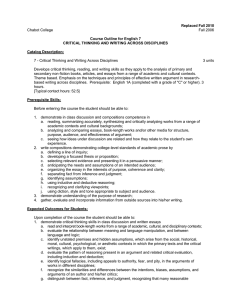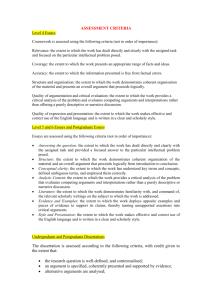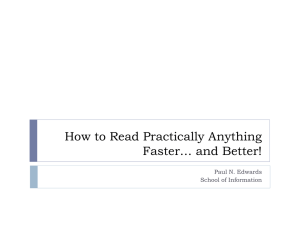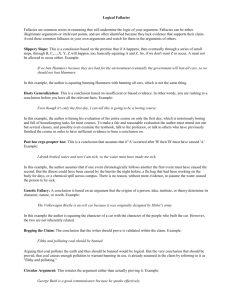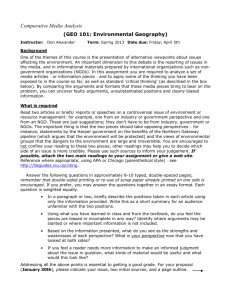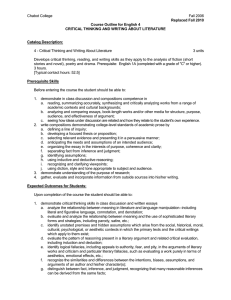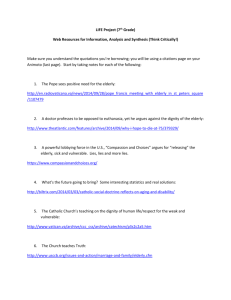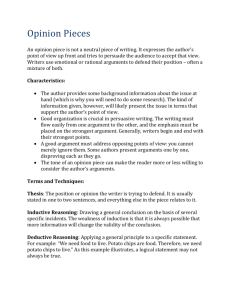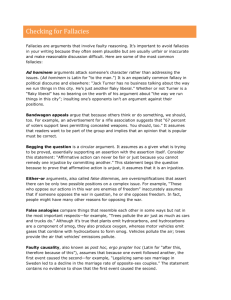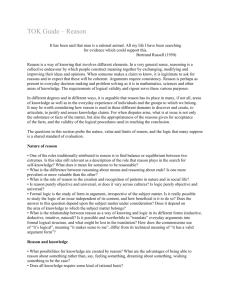Critical Thinking and Writing Across Disciplines
advertisement
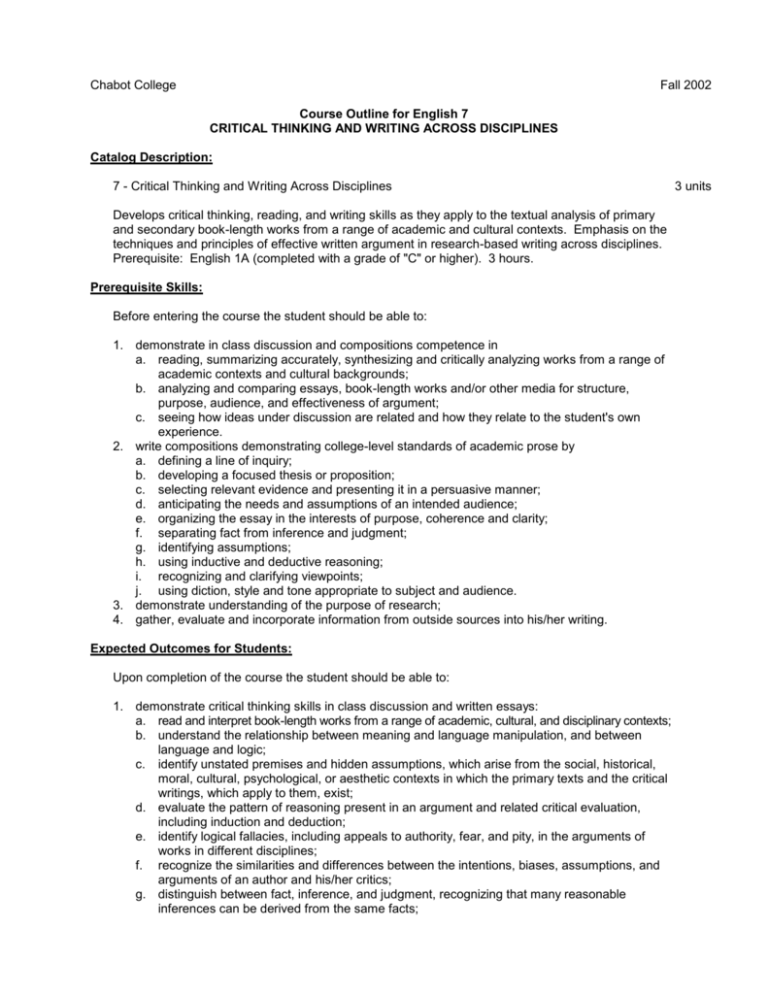
Chabot College Fall 2002 Course Outline for English 7 CRITICAL THINKING AND WRITING ACROSS DISCIPLINES Catalog Description: 7 - Critical Thinking and Writing Across Disciplines Develops critical thinking, reading, and writing skills as they apply to the textual analysis of primary and secondary book-length works from a range of academic and cultural contexts. Emphasis on the techniques and principles of effective written argument in research-based writing across disciplines. Prerequisite: English 1A (completed with a grade of "C" or higher). 3 hours. Prerequisite Skills: Before entering the course the student should be able to: 1. demonstrate in class discussion and compositions competence in a. reading, summarizing accurately, synthesizing and critically analyzing works from a range of academic contexts and cultural backgrounds; b. analyzing and comparing essays, book-length works and/or other media for structure, purpose, audience, and effectiveness of argument; c. seeing how ideas under discussion are related and how they relate to the student's own experience. 2. write compositions demonstrating college-level standards of academic prose by a. defining a line of inquiry; b. developing a focused thesis or proposition; c. selecting relevant evidence and presenting it in a persuasive manner; d. anticipating the needs and assumptions of an intended audience; e. organizing the essay in the interests of purpose, coherence and clarity; f. separating fact from inference and judgment; g. identifying assumptions; h. using inductive and deductive reasoning; i. recognizing and clarifying viewpoints; j. using diction, style and tone appropriate to subject and audience. 3. demonstrate understanding of the purpose of research; 4. gather, evaluate and incorporate information from outside sources into his/her writing. Expected Outcomes for Students: Upon completion of the course the student should be able to: 1. demonstrate critical thinking skills in class discussion and written essays: a. read and interpret book-length works from a range of academic, cultural, and disciplinary contexts; b. understand the relationship between meaning and language manipulation, and between language and logic; c. identify unstated premises and hidden assumptions, which arise from the social, historical, moral, cultural, psychological, or aesthetic contexts in which the primary texts and the critical writings, which apply to them, exist; d. evaluate the pattern of reasoning present in an argument and related critical evaluation, including induction and deduction; e. identify logical fallacies, including appeals to authority, fear, and pity, in the arguments of works in different disciplines; f. recognize the similarities and differences between the intentions, biases, assumptions, and arguments of an author and his/her critics; g. distinguish between fact, inference, and judgment, recognizing that many reasonable inferences can be derived from the same facts; 3 units Chabot College Course Outline for English 7, Page 2 Fall 2002 h. draw and justify inferences about a work, the intention of the author or the effect of the text based on purpose, context, audience, etc... ; i. evaluate cross-disciplinary arguments in terms of fairness, accuracy, completeness, and effectiveness; j. synthesize and relate ideas from texts across the curriculum; k. recognize the disciplinary contexts and perspectives within which arguments are constructed, and how various disciplines evaluate similar arguments differently. 2. demonstrate composition skills: a. explore a line of inquiry and limit the topic appropriately; b. establish and state clearly a unifying thesis or proposition; c. select examples, details, and other evidence to support or validate the thesis and other generalizations; d. use detail, example, and evidence to develop and elaborate upon subtopics; e. use principles of inductive and deductive logic to support and develop ideas; f. avoid logical fallacies in the presentation of argument; g. organize main parts of the essay and define a sequence that contributes to clarity; h. achieve coherence; I. use precise diction which communicates unambiguously; J. write with a sense of an audience in mind. 3. use appropriate research techniques to produce an acceptable research paper: a. become familiar with appropriate library resources for research; b. demonstrate understanding of purposes of research; c. investigate the legitimate and honest use of research; d. identify and evaluate sources; e. demonstrate understanding of concerns in data collection (i.e. accuracy, sampling, validity and reliability); f. investigate diverse discipline-specific research methods, including kinds of questions posed in different academic fields; g. formulate a productive research question; h. demonstrate understanding of the role of summary, paraphrase, and direct quotation in note taking; i. efficiently gather and record information; j. organize information; k. integrate source material into the paper (i.e. through conventions of direct and indirect quoting); l. correctly utilize systems of documentation (MLA) and bibliography. Course Content: 1. Instruction focused on critical thinking, reading, and writing: a. Stressing the connection between thinking, reading, and writing, and use each as a reinforcement for the other b. Reflecting the diversity in subject matter, cultural perspective and gender perspective, national or geographic background, time period, structure and theme c. Distinguishing between fact and inference d. Developing logical inferences e. Avoiding logical fallacies f. Recognizing denotative and connotative language g. Evaluating diction h. Exploring rhetorical uses of writing i. Responding to style j. Constructing sound arguments k. Avoiding fallacies l. Supplying sufficient support for claims m. Using outside sources n. Refuting objections o. Writing with grace and style Chabot College Course Outline for English 7, Page 3 Fall 2002 Methods of Presentation: 1. Class Activities a. Small group activities—which may include brainstorming, enactment, problem solving, role playing, advocacy, peer evaluation b. Lecture c. Guided discussion 2. Required writing, problem solving, skills demonstration and/or proficiency: a. In-class and out-of-class essays clearly stating an argument and supporting the argument with logical and sound exemplification b. Revision of written arguments to improve effectiveness c. Revision of written arguments coupled with instruction, to demonstrate progressive improvement and refinement of writing style, structure, coherence, and emphasis d. At least five essays (totaling 8,000 words) supporting analytical arguments that identify and comment on readings across the curriculum e. At least one researched paper that posits a logically supported argument and is based on a synthesis and analysis of a variety of primary and secondary sources, which may include: 1. print materials 2. audio video presentations 3. interviews 4. personal observations 5. computer databases Typical Assignments and Methods of Evaluating Student Progress: 1. Typical Assignments a. Read Browne's chapter 8, "How Good is the Evidence." Use Browne's guidelines to analyze Cromer's review of Galileo. b. Read Cromer's chapter "Education in an Age of Science." Prepare a 300-word reading log responding to this chapter. 2. Methods of Evaluating Student Progress Grades A-F, according to performance on essays, research paper, and other measures deemed appropriate by the instructor. Evaluation of students' achievement of the course objectives will be based on both critical thinking and writing skills, specifically the following: a. Clarity and effectiveness of writing and the degree to which it successfully incorporates principles of composition and of logical reasoning taught in the course b. Clarity of understanding of assigned literature and other readings and the degree to which students are successful in using logical reasoning principles to reach conclusions about the works considered c. Participation in class presentations and responses Textbook(s) (Typical): Asking the Right Questions, McNeill Browne, Stuart M. Keeley, Prentice Hall, 1998. The Autobiograpy of Malcolm X, Alex Haley, Ballantine Pub., 1965. Civilization and Its Discontents, Sigmond Freud, Norton Pub. (any recent edition) Elements of Argument, Annette Rothenberg, St. Martins Press, 1999. Thus Spake Zarathustra, Friedrich Nietzche, Penguin Pub. (any recent edition) Uncommon Sense, The Heretical Nature of Science, Alan Cromer, Oxford Univ. Press, 1997 Special Student Materials: None dk 10/31/01 D:\CURRIC\FALL01\ENG7REV.DOC
